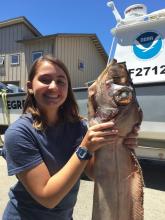As a freshman I started working in Dr. Taylor's lab studying the sensory biology of marine microzooplankton. Starting to work in a lab early in my undergraduate career was essential as it gave me valuable experience which prepared me for future research opportunities. I worked in the Taylor lab for 4 semesters and was awarded the state-wide George Barthalmus research grant for motivated sophomores engaged in independent research projects. As a junior I was able to attend the State of North Carolina Undergraduate Research and Creativity Symposium to present all of the research I had been working on since my freshman year. I am also a NOAA Hollings scholar and for my summer internship I worked at the Southwest Fisheries Science Center in Santa Cruz, California studying the life history and ecosystem interactions of the ribbonfish "king-of-the-salmon." During my internship I was lucky enough to go on a 2-week research cruise to monitor the abundance of commercially important groundfishes. I plan to attend two conferences on the west coast to present the findings from my summer research. Currently I am working on my honors project in Dr. Scharf's lab studying stable isotope signatures in non-native catfish.
When I came to UNCW I wanted to get involved in research as soon as possible. As a freshman I took advantage of the resources around me, and through my attendance of BIO 202 SI sessions, I found out about an opening in Dr. Taylor's lab. I immediately jumped on the opportunity to get involved in one of the many interesting projects occurring in the lab. I hoped to gain lab experience and insight into the research process while also learning about a new area of science. After I started working in the lab, my research career snowballed--I was awarded grants, the Hollings scholarship, and I even attended a conference. I've learned that if you take advantage of opportunities that interest you at UNCW and start small, you can eventually work your way up to more prestigious distinctions.
I cannot say how impactful my research experiences have been. Over the summer after my freshman year I worked in the lab and became proficient in the graduate-level techniques of electrophysiology and high-speed video microscopy. At first there was a huge learning curve, but I worked with supportive people who encouraged me to try my best, even if that meant messing up a few times before I got things right. As a Hollings scholar I learned how to utilize computer programming for data analysis, develop growth models based on fish morphology, and how to age fish--a very valuable skill in ichthyology and fisheries management. I also learned the ins and outs of working on a research cruise, such as how not to get seasick while sorting through a few pounds of shrimp and fish larvae at 3 in the morning! My Hollings internship really challenged me to be even more independent as a researcher; to answer my questions on my own or to seek out the right people to help me answer my questions. Ultimately, I gained more confidence in my ability to plan and execute my own research project which will help me this year as I complete my honors project.
I ultimately hope to pursue higher education in a fisheries science or ichthyology program on the west coast. I believe that my research experiences at UNCW make me a very valuable candidate for such competitive programs. From learning about how to work in a lab setting, how to write a grant, and how to work in various field situations, I will be more prepared to complete meaningful research on the graduate level. While working for NOAA fisheries I met a bunch of people who I respect and could one day help me in finding a job or providing assistance or further collaborations on research endeavors.





